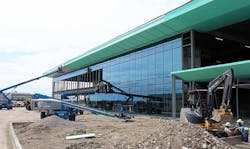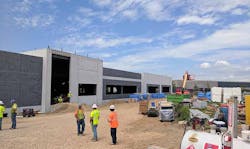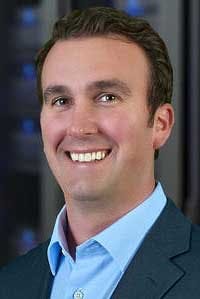There are many more hyperscale data centers to be built. Stream Data Centers would like to build some of them.
Stream is an experienced player in data center real estate, and has built a strong business delivering facilities for enterprises and service providers. The Dallas-based company sees an opportunity in building multi-facility developments where large technology companies deploy tens of thousands of servers.
“We think the industry is shifting, and that we can bring a creative real estate approach to the hyperscale market,” said Michael Lahoud, Chief Operating Officer and Partner at Stream Data Centers.
Stream’s expansion into the hyperscale sector reinforces the trend toward cloud campuses – large server farms to support the shift of IT capacity from corporate data centers to cloud computing platforms. As we noted back in 2015, the scale of these facilities will continue to grow as cloud computing gains momentum, driven by social networks, Big Data, artificial intelligence and the Internet of Things.
A History in the Data Center Sector
Stream Data Centers is a unit of Stream Realty, a large commercial real estate firm that has been an active developer and investor in the data center industry since 1999. Stream has developed more than 3 million square feet of data center space, representing more than 200 megawatts of power capacity.
Over the years, Stream Data Centers has proven adept at identifying trends in the data center market and creating new products to target growth sectors. The company’s initial focus was powered shell projects, featuring undeveloped space, with the power and fiber connectivity already in place. Stream’s customers included marquee names like Apple, Home Depot, AT&T, Sprint and Nokia.
In 2010 Stream Data Centers began developing private data centers, delivering finished turn-key facilities. It has built, leased and sold data centers in San Antonio, Dallas, Houston and Minneapolis. Its most recent project is a $250 million, 56,000 square foot Minneapolis data center for US Bank. Other private data centers built by Stream have been acquired by Databank and Zayo.
A data center project in the Minneapolis market being developed by Stream Data Centers. (Photo: Stream Data Centers)
“We’re going to continue building our private data centers,” said Lahoud. “We historically have been focused on the enterprise user niche. We believe this will continue to be a good business model. I think you’re seeing a dramatic reduction in the number of enterprises building their own data centers. We position our private data center as a healthy alternative.”
Thinking Hyperscale
Lahoud says that the construction techniques and strategies it has optimized for its private data centers will be useful in its new hyperscale offering – only applied at a larger scale.
“We like to look at the ultimate size of the park,’ said Lahoud. “We think delivering 200 megawatts is a good size for a park with multiple buildings.”
Stream says its hyperscale data centers will be available as ready-to-fit powered shells, develop an initial phase of turnkey space, with the ability to work with the tenant to build out the remainder of the facility. The “head start” component could feature 1 to 2 megawatts for immediate use.
Michael Lahoud, COO of Stream Realty.
Lahoud says Stream’s supply chain is equipped to deliver additional phases on the client’s timeline. The company’s ready-to-fit product typically features 150,000 square foot buildings that can be expanded to 350,000 SF.
Stream is entering a competitive and crowded sector of the data center market. Over the past year, as major cloud platforms have sought super-sized leases of turnkey space, existing players in the wholesale market have optimized their designs and supply chains to deliver lots of space, as quickly as possible. Service providers who have landed hyperscale deals of 10 megawatts or more include CyrusOne, DuPont Fabros Technology, Vantage, EdgeConnex and CloudHQ.
Geography is a big component of hyperscale data center development. Stream has procured land suitable for hyperscale campuses in the Dallas and Minneapolis markets, and Lahoud says there will likely be other projects to come. “We’re looking to expand outside the markets we’re currently in,” he said.
The Buzz in Dallas
Stream’s roots are in the Dallas market, which historically has been focused on service providers and enterprise customers rather than hyperscale requirements. That’s chaning with the recent arrival of a massive Facebook data center in Fort Worth.
The Dallas data center market, which has more than 200 megawatts of potential capacity in the pipeline. Already one of the largest and most active data center markets in the United States, Dallas market is benefiting from a confluence of site selection merits: excellent power and fiber infrastructure, competitive economic incentives and robust competition among service providers.
Stream knows the Dallas market well, and believes supply and demand remain in balance.
“There’s a lot of buzz around Dallas,” said Lahoud. “We’ve had a lot of growth here, and a lot of colocation providers adding capacity. We don’t feel like the supply is saturated. We’re going to keep investing here.”
Stream is also investing in developing a suite of services for data center tenants, including training, facilities maintenance and an energy services consultancy that helps procure renewable energy for data center tenants – a specialty that fits well with its growing focus on hyperscale tenants, who are among the ;argest users of green energy.
About the Author






